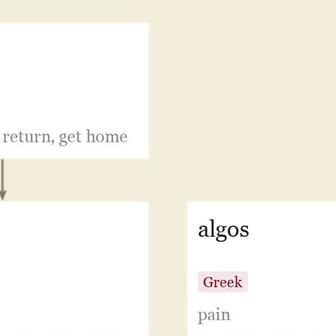homesickness (n.)
1756年,翻译德语 Heimweh,源自 Heim “家”(见 home(n.))+ Weh “悲伤,痛苦”; 这个复合词来自瑞士方言,表达对山的渴望,并在17世纪由瑞士雇佣兵引入其他欧洲语言。另请参见 nostalgia。
homesickness 的相关词汇
古英语中的"ham"意为"住所、房屋、居住地、固定住所; 财产; 村庄; 地区、国家",源自原始日耳曼语中的"*haimaz",意为"家"(也指古弗里斯兰语中的"hem",意为"家、村庄",古诺尔斯语中的"heimr",意为"住所、世界","heima",意为"家",丹麦语中的"hjem",中古荷兰语中的"heem",德语中的"heim",哥特语中的"haims",意为"村庄"),源自 PIE 中的"*(t)koimo-",是"*tkei-"的带后缀形式,意为"定居、居住、归属"。作为形容词的用法始于1550年代。古日耳曼语中"村庄"的意义保留在地名和"hamlet"中。
'Home' in the full range and feeling of [Modern English] home is a conception that belongs distinctively to the word home and some of its Gmc. cognates and is not covered by any single word in most of the IE languages. [Buck]
在[现代英语]中,"家"的全部范围和感觉是属于"home"及其一些日耳曼语同源词的概念,而在大多数印欧语言中没有任何一个单词能够涵盖这个概念。[巴克]
俚语短语"make (oneself) at home"(意为"在一个不居住的地方感到舒适")可追溯到1892年("at home",意为"自在",可追溯到1510年)。"keep the home fires burning"是1914年的一首歌曲标题。"nothing to write home about"(意为"平凡无奇")可追溯到1907年。"Home movie"可追溯到1919年; "home computer"可追溯到1967年。"Home stretch"(1841年)源自赛马(参见"stretch"(名词))。"Home economics"作为一门学科首次出现于1899年; 短语本身于1879年开始使用(因为"economy"的原始字面意义是"家庭管理",所以这个短语在词源上是多余的)。
作为体育运动或游戏的目标,"Home"可追溯到1778年。棒球中的"Home base"可追溯到1856年; 橄榄球中的"home plate"可追溯到1867年。体育运动中的"Home team"可追溯到1869年; "home field"(指当地球队的场地)可追溯到1802年(OED 第二版印刷中的1800年引文是日期错误,因为它指的是斯波坎福尔斯的棒球)。"Home-field advantage"可追溯到1955年。

1726年,“对回家或回到祖国的病态渴望,被视为一种疾病的严重思乡病”,这是现代拉丁语,由学者约翰内斯·霍费尔(1669-1752)在1688年在巴塞尔大学的一篇论文中首次提出,作为德语 heimweh "homesickness"的翻译(参见 home + woe)。
源自希腊语 algos "痛苦,悲伤,困扰"(参见 -algia)+ nostos "回家",来自 neomai "到达某个地方,逃脱,返回,回家",来自 PIE *nes- "安全回家"(与古挪威语 nest "旅行食物",梵文 nasate "接近,加入",德语 genesen "恢复",哥特语 ganisan "治愈",古英语 genesen "恢复"同源)。法语 nostalgie 在1754年的法国军队医疗手册中有记载。
最初是指瑞士人的病症,据说这种病症特别常见于他们,而且经常是致命的,无论是由其自身作用还是与伤口或疾病的结合。
[Dr. Scheuzer] had said that the air enclosed in the bodies of his countrymen, being in Æquilibrium with a rare and light air that surrounds them, was overloaded in lower countries with an air more dense and heavier, which compressing and obstructing the capillary vessels, makes the circulation slow and difficult, and occasions many sad symptoms. [Account of the publication of "Areographia Helvetiæ" in New Memoirs of Literature, London, March 1726]
[Dr. Scheuzer]曾经说过,他的同胞们体内封闭的空气,与环绕他们的稀薄轻盈的空气相比,在低地国家被更密集、更重的空气所压迫,这压迫并阻塞了毛细血管,使血液循环变得缓慢和困难,引发了许多病症。[ "Areographia Helvetiæ" 在新文学回忆录中的出版情况,伦敦,1726年3月]
到了1830年代,这个词被用来形容任何强烈的思乡病:海员的,罪犯的,非洲奴隶的。"风笛在苏格兰军团在海外服役时有时会产生同样的效果" [Penny Magazine," 1840年11月14日]。它被列在"实用医学百科全书" [伦敦,1833年,由三位医学博士编辑]中的"地方性疾病"中,定义为"那些离开祖国的人有时会产生的压抑症状,当他们被强烈的回家、回到朋友和青春时代的场景的渴望所困扰时...."
这主要是一个军事医学诊断,北方在美国内战中认为这是一个严重的医学问题:
In the first two years of the war, there were reported 2588 cases of nostalgia, and 13 deaths from this cause. These numbers scarcely express the real extent to which nostalgia influenced the sickness and mortality of the army. To the depressing influence of home-sickness must be attributed the fatal result in many cases which might otherwise have terminated favorably. ["Sanitary Memoirs of the War," U.S. Sanitary Commission, N.Y.: 1867]
在战争的前两年,报告了2588例思乡病,以及13例因此原因死亡。这些数字几乎无法表达思乡病对军队疾病和死亡率的真正影响。许多本来可能有望康复的病例,由于家乡的压抑影响,结果却是致命的。["战争卫生回忆录," U.S. Sanitary Commission, N.Y.: 1867]
转义意义(主要的现代含义)"对过去的怀旧之情"在1920年被记录下来,可能源于法国文学中对 nostalgie 的使用。对远方的渴望也必然涉及到时间的分离。
- Heimweh
- homesick